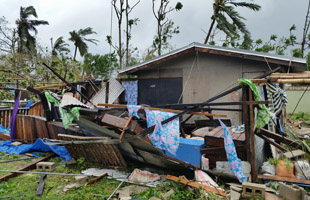
Nearly a week after Tropical Cyclone Pam unleashed her wrath on the island nation of Vanuatu, the fate of at least 20 000 people living in the country’s southern islands remains unclear. The southern province of Tafea bore the brunt of the cyclone’s force experiencing winds of up to 320 kilometres per hour, reportedly flattening whole villages and leaving thousands homeless.
“The cyclone has left a huge humanitarian crisis. We are only now getting a true sense of the scale and scope of the disaster,” said Dr Jacob Kool, WHO Country Liaison Officer to Vanuatu. “The airport [which had been closed since the cyclone] has just reopened, which has allowed us to deploy teams to the south to get a measure of the likely devastation that has occurred and to mobilize health resources to respond.”
The WHO Country Liaison Office has been working with the WHO Division of Pacific Technical Support in Suva, the WHO Regional Office for the Western Pacific in Manila and WHO headquarters in Geneva to mobilize all of the necessary resources to support the Ministry of Health’s emergency response in Vanuatu.
The reopening of Vanuatu’s airport will allow much-needed aid to flow into the country and from the capital to the provinces. Today, a WHO team of public health experts arrived in Port Vila and is assisting the Ministry of Health’s surveillance and response efforts following the disaster. Emergency health kits to support up to 50 000 people have arrived in country.
“The displacement of so many people and damage to critical health infrastructure create the environment for disease outbreaks,” Dr Kool said. “Our immediate priorities are to re-establish communication and transport systems so injured people can be treated, and strengthen our ongoing disease surveillance and response work.”
“Coordination is essential in any emergency response and the same is true in Vanuatu,” said Dr Kool. “We are supporting the Ministry of Health to ensure the aid provided by international partners and organizations is put to use where it is needed most.”
One of the early challenges has been to ensure that individuals and organizations wanting to help, notify the Ministry of Health and WHO, so that proper coordination can happen. “We request anyone or any organization wishing to help, to ensure they contact the Ministry of Health and WHO, so we can ensure their skills are matched with the needs,” said Dr Kool. The outpouring of international support for the people of Vanuatu has been significant. “We are very thankful to the governments, agencies and individuals that have rallied to support Vanuatu and its people,” said Dr Kool.
Acknowledging the support provided to date, Dr Kool noted that the impact of Cyclone Pam will be long lasting, with the need to rebuild health and infrastructure systems beyond this initial emergency phase. “We are in this for the long haul,”
said Dr Kool.




